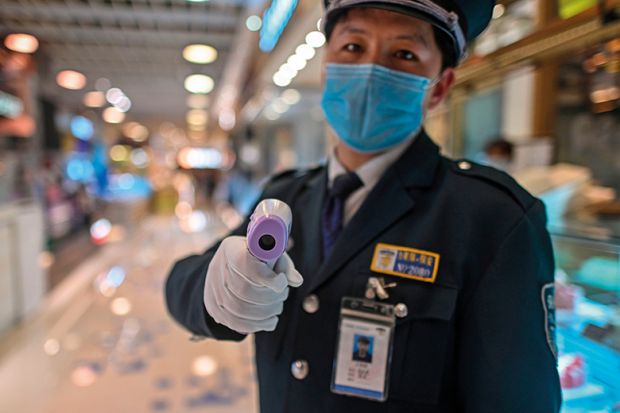Concerns have been raised about the treatment of Chinese academics deemed to have strayed from official narratives about the Covid-19 pandemic.
According to news reports and testimony from some of those involved, there has been an increase in online harassment and censorship, and in some cases interventions by universities and the police, as Beijing bristles against international criticism.
The claims come as Wuhan Diary, a critical first-hand account of lockdown conditions by the popular author Fang Fang, is set to be translated into English.
Peidong Sun, a Chinese historian, told Times Higher Education that she faced criticism for speaking about academic freedom and the new coronavirus. After finishing her teaching loads for Fudan University in January, she left for France in early February, where she is now a visiting professor at Sciences Po.
Professor Sun actively discussed the novel coronavirus on Chinese social media platforms, although many posts were deleted. In January, she wrote about 70 Covid-19 posts on her personal Weibo account, which had more than 50,000 followers. She also used Fudan’s WeChat groups to ask for preventive measures against the coronavirus, such as better mask distribution.
One Weibo post, which called for a statue to honour the late Li Wenliang, the doctor who was an early whistleblower on the epidemic, drew criticism from a Communist Party official at the university, who, Professor Sun alleged, asked her to delete the post. When Professor Sun refused, she was removed from all of Fudan’s WeChat groups, she said in an essay published by the Council on Foreign Relations. Fudan did not respond to a request for comment.
Outside official channels, Professor Sun has been the target of online abuse. “When I said I supported Fang Fang on Weibo, a flood of gangsters cursed me every day,” she said.
She felt that the space for debate had narrowed since the pandemic began. “The more of a crisis China has, the more attacks or punishments [there are] towards Chinese intellectuals, such as professors, lawyers and investigative journalists, who tell the truth about China issues,” she said.
Professor Sun also felt that female netizens like herself were more likely to face online harassment.
Hubei University said on 26 April that it was investigating Liang Yanping, a Chinese language and literature professor, while Hainan University said on 30 April that it was investigating Wang Xiaoni, a poet and retired professor. The state media reported that they were being questioned for comments about Hong Kong and a shrine in Japan. However, the controversy over their now-deleted posts seems to stem mostly from discussions of Fang Fang. The universities did not respond to requests for comment.
In other cases, two constitutional law scholars were pressured after posting open letters and essays linking the coronavirus response to political reform.
In one of those cases, Tsinghua University has suspended and is investigating Xu Zhangrun, Hong Kong media reported in March. The month before, he had written an essay and signed an open letter critical of the government, and was subsequently placed under house arrest. Tsinghua declined to comment.
Katrin Kinzelbach, co-director of the master’s in human rights programme at the University of Erlangen-Nuremberg (FAU) in Germany, said “it is important to understand the persecution of individual scholars as one phenomenon of a larger pattern. By cracking down on a few professors, many more scholars are incentivised to self-censor.”
Steve Tsang, director of the China Institute at SOAS University of London, said China had been “reducing the scope for academic freedom for several years, and this clearly predates Covid-19. But the scope for academic freedom has certainly been reduced further since the pandemic.”
He added that the government’s priority was “to keep a tight control over the narrative, both domestically and globally. This includes putting forth the narrative that China is not to blame for the pandemic. Hence, it is essential that Chinese scholars, scientists or otherwise, as well as journalists, do not provide information, data or analysis that contradicts the government’s narrative.”
Clare Robinson, director of advocacy at Scholars At Risk, said: “Efforts by Chinese authorities to punish scholars amid the Covid-19 outbreak should be deeply alarming for all of us, regardless of our profession or where we reside.
“Especially during national and global crises, like Covid-19, scholars have a social responsibility to sound the alarm and publicly discuss the problem at hand, how governments and other stakeholders respond, and the conditions under which they’re operating, including respect (or lack thereof) for academic freedom.”
Register to continue
Why register?
- Registration is free and only takes a moment
- Once registered, you can read 3 articles a month
- Sign up for our newsletter
Subscribe
Or subscribe for unlimited access to:
- Unlimited access to news, views, insights & reviews
- Digital editions
- Digital access to THE’s university and college rankings analysis
Already registered or a current subscriber? Login







